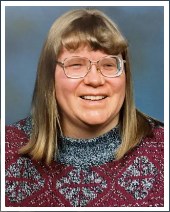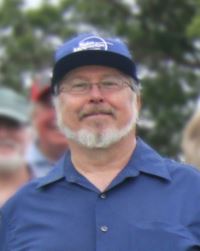Sue Balliette (1953-2023)

Sue Balliette joined the Madison Astronomical Society in the late 1960s as a high school student after she learned of the club during a visit to the Washburn Observatory. Sue had a visual impairment that prevented her from driving. To ensure her participation in MAS, her father Roger drove her to the meetings and joined the club himself. Attending meetings with Sue ignited Roger’s interest in astronomy and the two would go on to be active members and serve on its board through the 1970s and 1980s. Sue served many terms as secretary and Roger served as secretary and later as president.
By the end of the 1980s, Roger’s health was deteriorating, and he was having trouble driving. In 1988 he became disabled and died in 1991. Lacking reliable transportation, Sue thought her involvement with MAS had ended for good. But in late 2020, as I was working on the club history project, I located her and re-established contact.
Sue’s involvement with the club had been important to her as a young woman and, when she could no longer participate, its absence left a big hole in her life which she always regretted. When I got in touch with her in 2020, I immediately invited her back because we were meeting via Zoom due to the COVID-19 pandemic. Sue knew how to use Zoom and enthusiastically accepted my invitation. However, after visiting MAS’s website, she thought that meeting attendance required membership and, due to her fixed income, she could not afford to join. MAS’s board considered the issue and immediately decided to give Sue an honorary lifetime membership. Sue happily attended meetings for the duration of the pandemic. After we began to return to in-person meetings by the end of 2022, I offered to arrange rides for Sue to come to the meetings in person but she always declined. I don’t believe it was a lack of interest, but perhaps she didn’t want to be a bother.
While writing the History of the Madison Astronomical Society, 1935-1988, I interviewed Sue extensively. She related many anecdotes from her years in the club. Here are two that stuck with me:
Sue recalled her pleasure at being the motivating influence that got MAS to pass a smoking ban sometime during the 1970s. She reported that some of the men were upset with her that they could no longer smoke in the meetings but, as an asthma sufferer, Sue felt it was the right choice and stood by her activism. And the vote to ban smoking passed with no opposition!
Sue was an enthusiastic fan of Star Trek (the original television series). In the early 1970s, this was still fresh and considered cutting-edge sci-fi. Among MAS members, Sue found several other fans. She loved the chance to socialize with people of like mind and be given the chance to chat about their Trekkie fandom. As the club historian, reconnecting Sue with MAS felt significant to me. Sue was a link to an earlier era of MAS, and her stories contributed much to fleshing out the activities of the club from the late 1960s through the 1980s. One of her contributions centered around the fact that women were in the minority, so female MAS members tended to stick together. Many of Sue’s fondest memories of the club were tied to the various women she became friends with over the years due to her connection to the group. Sue also contributed important recollections of one of MAS’s founding members, Paula Birner Carey.
Despite her mobility and visual challenges, Sue remained very active socially. While the pandemic limited many opportunities, it opened others up because of the proliferation of online meetings. Deeply devout, Sue was active with her church friends and loved talking about books and discussing religious topics. She served on the Madison Disability Rights Commission and maintained close touch with many Alcoholics Anonymous friends, despite her many years of sobriety. And of course, she rejoined the astronomical society. Sue’s life centered around friendships and public service.
Sue died in her sleep on December 28th, just a couple weeks shy of her 71st birthday.
(Written by John Rummel, January 2024. Photo from Sue’s online obituary found at https://www.gundersonfh.com/obituaries/Susan-Balliette?obId=30237029)
For me the stars on a black velvet sky surpass the beauty of a great sunset or a beautiful forest. The starry sky touches the heart and love of God, who created it all.
(Concluding lines of an essay Sue wrote around 2005 on her years in the Madison Astronomical Society.)
Wynn Wacker (1949-2023)

At the August 11th 2023 meeting of the Madison Astronomical Society, we learned that the Society had lost one of its longest serving members and guiding forces, Wynn Wacker.
Wynn was born in Madison on November 14, 1949, to Roland and Midge Wacker. From an early age, Wynn was fascinated with all things science and devoured books and TV shows such as Mr. Wizard. Early on, he acquired an Edmund Scientific 3-inch reflector telescope and with the help of a dime store Handbook of the Heavens, began to teach himself the sky. Wynn’s parents were always supportive of his interests and he later was able to upgrade to a six-inch telescope and began to build a library of reference books and atlases that served him well into adulthood. His interests extended far beyond the astronomical into most other areas of science.
From childhood, Wynn’s wry sense of humor was also in evidence. He loved Mad Magazine and National Lampoon, and younger sister Gaye was on the receiving end of many pranks and practical jokes. Later in life, Wynn was always quick with an amusing anecdote to punctuate a discussion about almost any topic, scientific or otherwise. His laughter was full and infectious.
Wynn first encountered the Madison Astronomical Society in the form of the Junior Society while a student at Cherokee Junior High (now middle school). It was probably around 9th grade (1963-64) that his friend Cynthia Karp invited him to join the Juniors, which was the young persons’ entree to the Society. In those days, the MAS had an age requirement of 18. Soon after, in the halls of West High School, Wynn met Eric Thiede who was to become a lifelong friend and fellow member of the Society.
Wynn grew into a science-obsessed young man during those years at West, graduating from high school in the spring of 1967. He later described his high school self as the “prototypical nerd, with glasses, briefcase and pocket protector. Needless to say,” he added, “the profile went with some harassment, since ‘nerd’ did not become a badge of honor until much later.” Having friends like Eric and the nerd culture at West helped him clarify his scientific interests.
Wynn went on to the UW Madison and graduated in 1971 with a degree in Molecular Biology. With the Vietnam war escalating, his desire to enter graduate school was delayed briefly until his draft status could be resolved. During those years, his involvement in the Society continued and he earned praise for his Jupiter observations through the Association of Lunar and Planetary Observers. He served a term as MAS president in 1973-74.
Wynn was married in 1973 and ultimately not drafted into the war. He did several years of graduate work at UW and made significant progress toward his PhD, but ultimately abandoned those plans and moved to Maryland with his wife in 1977 so she could pursue her own graduate studies. While there Wynn worked for a series of biotech firms. His marriage ended in divorce after about a dozen years and by 1992, Wynn had moved back to his hometown to take a job with Lunar Corporation where he worked in the IT end of diagnostic imaging. Lunar was later acquired by GE and Wynn spent most of his career there.
Upon returning to Madison, Wynn found an MAS that had undergone many changes while he was away. It had a new observatory in Green County and was beginning to experience the technological revolution that came with the personal computer age and, a few years later, the rise of the internet. He dived right in and maintained a high level of involvement that continued right up to his death. Wynn served on the board of directors as vice president for most of the decade from 2000-2010 and played many other important roles within the club. He participated in nearly all the club’s outreach activities in those years. He advocated for and contributed to efforts to attract young people to the club. He spearheaded fundraising efforts to add facilities to the Yanna Research Station. He was always willing to write an article when the club had a newsletter and loved giving talks at our Moon Over Monona public events.
It’s hard to think of many MAS events that Wynn missed. His friendly smile and ever-present MAS ball cap were fixtures at our meetings, outreach events, picnics and banquets.
In the final year of his life, Wynn had begun to experience health issues which he feared would eventually impact his mobility and ability to live independently. Wynn was very private and valued his independence fiercely. When he realized that this solitary and private lifestyle would soon be in jeopardy, he put into action a plan to end his own life quickly and painlessly. On August 5th, he carried out his plan. Ever the scientist, Wynn had carefully researched the options beforehand and was ready to take control of this final stage of his life.
Wynn’s lasting legacy to the club may be his quiet, steady leadership and his ability to be the voice of reason when disagreements surfaced. Many a meeting characterized by exchanges of heated opinions gave way to calmer resolutions when Wynn spoke up and put things in a larger context.
We’ll miss you Wynn.
(Written by John Rummel, August 2023. Photo of Wynn is from the MAS Transit of Venus event at Donald Park on June 5, 2012, photo by John Rummel)
